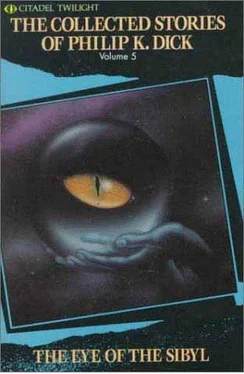All his communications gear fumbled along on autostasis, at the moment, monitoring whatever the hell they monitored. Originally, upon being stationed at CY30 II, McVane had thoroughly studied the function and purpose of the complexes of electronic marvels for which he was the caretaker—or rather, as his job coding put it, the “master homonoid overseer.” Now he had allowed himself to forget most of the transactions which his charges engaged in. Communications equipment led a monotonous life until an emergency popped up, at which point he ceased suddenly to be the “master homonoid overseer” and became the living brain of his station.
There had not been an emergency yet.
The newspaper contained a funny item from the United States Federal Income Tax booklet for 1978, the year McVane had been born. These entries appeared in the index in this order:
Who Should File
Widows and Widowers, Qualifying
Winnings—Prizes, Gambling, and Lotteries
Withholding—Federal Tax
And then the final entry in the index, which McVane found amusing and even interesting as a commentary on an archaic way of life:
Zero Bracket Amount
To himself, McVane grinned. That was how the United States Federal Income Tax booklet’s 1978 index had ended, very appropriately, and that was how the United States, a few years later, had ended. It had fiscally fucked itself over and died of the trauma.
“Food ration comtrix,” the audio transducer of his radio announced. “Start unbolting procedure.”
“Unbolting under way,” McVane said, laying aside his newspaper.
The speaker said, “Put helmet on.”
“Helmet on.” McVane made no move to pick up his helmet; his atmosphere flow rate would compensate for the loss; he had redesigned it, too.
The hatch unscrewed, and there stood the food man, headbubble and all. An alarm bell in the dome’s ceiling shrilled that atmospheric pressure had sharply declined.
“Put your helmet on!” the food man ordered angrily.
The alarm bell ceased complaining; the pressure had restabilized. At that, the food man grimaced. He popped his helmet and then began to unload cartons from his comtrix.
“We are a hardy race,” McVane said, helping him.
“You have amped up everything,” the food man observed; like all the rovers who serviced domes, he was sturdily built and he moved rapidly. It was not a safe job operating a comtrix shuttle between mother ships and the domes of CY30II. He knew it, and McVane knew it. Anybody could sit in a dome; few people could function outside.
“Stick around for a while,” McVane said after he and the food man had unloaded and the food man was marking the invoice.
“If you have coffee.”
They sat facing each other across the table, drinking coffee. Outside the dome the methane messed around, but here neither man felt it. The food man perspired; he apparently found McVane’s temperature level too high.
“You know the woman in the next dome?” the food man asked.
“Somewhat,” McVane said. “My rig transfers data to her input circuitry every three or four weeks. She stores it, boosts it, and transmits it. I suppose. Or for all I know—”
“She’s sick,” the food man said.
McVane said, “She looked all right the last time I talked to her. We used video. She did say something about having trouble reading her terminal’s displays.”
“She’s dying,” the food man said, and sipped his coffee.
In his mind, McVane tried to picture the woman. Small and dark, and what was her name? He punched a couple of keys on the board beside him, her name came up on its display, retrieved by the code they used. Rybus Rommey. “Dying of what?” he said.
“Multiple sclerosis.”
“How far advanced is it?”
“Not far at all,” the food man said. “A couple of months ago, she told me that when she was in her late teens she suffered an—what is it called? Aneurysm. In her left eye, which wiped out her central vision in that eye. They suspected at the time that it might be the onset of multiple sclerosis. And then today when I talked to her she said she’s been experiencing optic neuritis, which—”
McVane said, “Both symptoms were fed to M.E.D.?”
“A correlation of an aneurysm and then a period of remission and then double vision, blurring… you ought to call her up and talk to her. When I was delivering to her, she was crying.”
Turning to his keyboard, McVane punched out and punched out and then read the display. “There’s a thirty to forty percent cure rate for multiple sclerosis.”
“Not out here. M.E.D. can’t get to her out here.”
“Shit,” McVane said.
“I told her to demand a transfer back home. That’s what I’d do. She won’t do it.”
“She’s crazy,” McVane said.
“You’re right. She’s crazy. Everybody out here is crazy. You want proof of it? She’s proof of it. Would you go back home if you knew you were very sick?”
“We’re never supposed to surrender our domes.”
“What you monitor is so important.” The food man set down his cup. “I have to go.” As he got to his feet, he said, “Call her and talk to her. She needs someone to talk to and you’re the closest dome. I’m surprised she didn’t tell you.”
McVane thought, I didn’t ask.
After the food man had departed, McVane got the code for Rybus Rommey’s dome, and started to run it into his transmitter, and then hesitated. His wall clock showed 1830 hours. At this point in his forty-two-hour cycle, he was supposed to accept a sequence of high-speed entertainment audio– and videotaped signals emanating from a slave satellite at CY30 III; upon storing them, he was to run them back at normal and select the material suitable for the overall dome system on his own planet.
He took a look at the log. Fox was doing a concert that ran two hours. Linda Fox, he thought. You and your synthesis of old-time rock and modern-day streng. Jesus, he thought. If I don’t transcribe the relay of your live concert, every domer on the planet will come storming in here and kill me. Outside of emergencies—which don’t occur—this is what I’m paid to handle: information traffic between planets, information that connects us with home and keeps us human. The tape drums have got to turn.
He started the tape transport at its high-speed mode, set the module’s controls for receive, locked it in at the satellite’s operating frequency, checked the wave-form on the visual scope to be sure that the carrier was coming in undistorted, and then patched into an audio transduction of what he was getting.
The voice of Linda Fox emerged from the strip of drivers mounted above him. As the scope showed, there was no distortion. No noise. No clipping. All channels, in fact, were balanced; his meters indicated that.
Sometimes I could cry myself when I hear her, he thought. Speaking of crying.
“Wandering all across this land,
My band.
In the worlds that pass above,
I love.
Play for me, you spirits who are weightless.
I believe in drinking to your greatness.
My band.”
And behind Linda Fox’s vocal, the syntholutes which were her trademark. Until Fox, no one had ever thought of bringing back that sixteenth-century instrument for which Dowland had written so beautifully and so effectively.
“Shall I sue? shall I seek for grace?
Shall I pray? shall I prove?
Shall I strive to a heavenly joy
With an earthly love?
Are there worlds? are there moons
Where the lost shall endure?
Shall I find for a heart that is pure?”
What Linda Fox had done was take the lute books of John Dowland, written at the end of the sixteenth century, and remastered both the melodies and the lyrics into something of today. Some new thing, he thought, for scattered people as flung as if they had been dropped in haste: here and there, disarranged, in domes, on the backs of miserable worlds and in satellites—victimized by the power of migration, and with no end in sight.
Читать дальше









